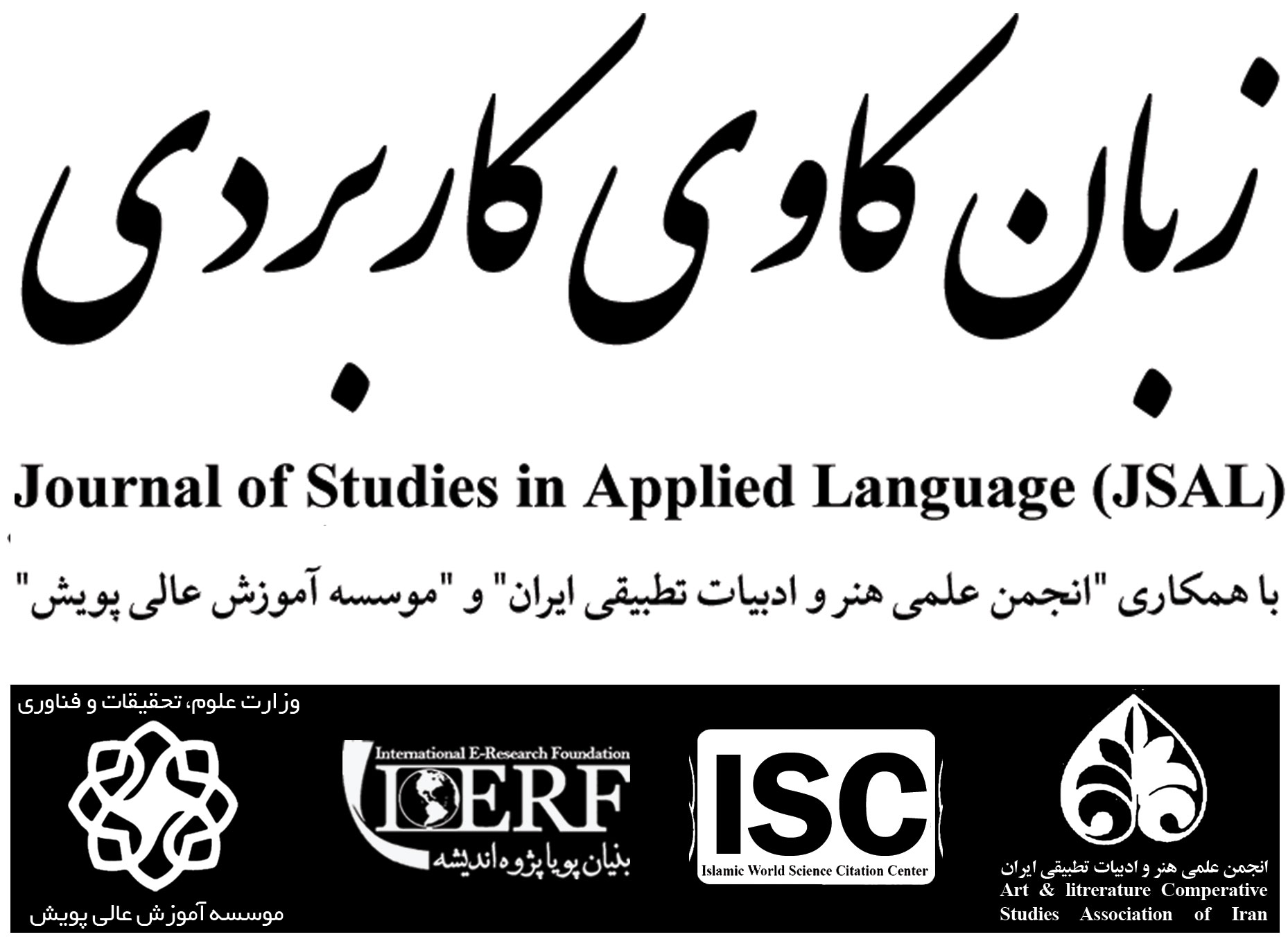<>
Volume 6, Issue 3 (8-2023)
JSAL 2023, 6(3): 1-24 |
Back to browse issues page
Download citation:
BibTeX | RIS | EndNote | Medlars | ProCite | Reference Manager | RefWorks
Send citation to:



BibTeX | RIS | EndNote | Medlars | ProCite | Reference Manager | RefWorks
Send citation to:
Adekunle A, Emmanuel Ọmọniyì Ọ. (2023). The Etymo-Morphological Analysis of Some Mis-Pronounced Selected Yoruba Place Names in Modern Cities; Constituent Interrogatives in Yoruba: A Minimalist Description [In English]. JSAL. 6(3), 1-24. doi:10.61186/jsal.6.3.1
URL: http://jsal.ierf.ir/article-1-93-en.html
URL: http://jsal.ierf.ir/article-1-93-en.html
1- Department of Linguistics and Nigerian Languages, Olabisi Onabanjo University, Ago-Iwoye, Ogun State, Nigeria
2- Department of Linguistics and Nigerian Languages, Ọlabisi Ọnabanjo University, Ago-Iwoye, Ogun state, Nigeria ,olanrewaju.emmanuel@oouagoiwoye.edu.ng
2- Department of Linguistics and Nigerian Languages, Ọlabisi Ọnabanjo University, Ago-Iwoye, Ogun state, Nigeria ,
Abstract: (3820 Views)
Constituent interrogatives are employed to request for more than yes/no answers from interlocutors. Extant works on constituent interrogatives in Yorùbá are yet to pay adequate attention to the syntactic behaviour of question nouns (QNs), question verbs (QVs) and interrogative qualifiers in the language. Therefore, this paper investigated the syntax of constituent interrogatives in Yorùbá with a view to providing plausible evidence showing QNs, QVs and interrogative qualifiers as constituent interrogative markers in the language. Primary and secondary data were collected and subjected to syntactic analysis within the confines of Minimalist Program (MP). Yorùbá uses the following to form its constituent interrogatives: QVs (dà, ńkọ́), QNs (ta, kí, èwo, mélòó, èló, ìkelòó) and interrogative qualifiers (wo, kelòó). A QN is copied to the clause left peripheral position in a content-word question unlike an echoed question. Wo as the interrogative qualifier, that is the question marker (QM) in ìgbà wo ‘when’ ibo (ibi è(wo) ‘where’, báwo (bá wo) ‘how’ has its [+Q], the question feature percolated through the entire DPs, that is the question phrases (QPs). A QN does more than satisfying focus requirement in the language while the QVs (dà and ńkọ́) perform predicate function. A QN qualifies a preceding noun just like a nominal qualifier does in an affirmative sentence in the language.
Keywords: Constituent Interrogatives, Minimalist Program, Question Markers, Question Feature, Yorùbá
Type of Study: Research |
Subject:
Discourse Analysis
Received: 2022/11/2 | Accepted: 2023/07/1 | Published: 2023/07/30
Received: 2022/11/2 | Accepted: 2023/07/1 | Published: 2023/07/30
References
1. Aboh, E. O., Pfau, R. (2011). What's a Wh-word Got to Do with It? The Cartography of Syntatic Structures, B. Paola. Ed. New York: Oxford University Press.
2. Ajíbóyè, O. (2005). Topics on Yorùbá Nominal Expressions. Ph.D Thesis. University of British Columbia.
3. Àkànbí, T. A. (2011). "The syntax and Semantics of Interrogative Verbs "Dà" and "Ńkọ́" in Yorùbá". Inquiry in African Languages and Literatures. No. 8. pp. 1-26.
4. Akanbi, T. A. (2016). "On The WH Question Particle [Wo] In Yorùbá̀". European Scientific Journal, ESJ, Vol. 12, No. 17, pp. 414-430. Doi: 10.19044/esj.2016.v12n17p414.
5. Awóbùlúyì, O. (1978). Essentials of Yorùbá Grammar. Oxford University Press Ibadan, Nigeria.
6. Awóbùlúyì, O. (2008). Ẹ̀kọ́ Ìṣẹ̀dá-Ọ̀rọ̀ Yorùbá. Montem Paperbacks, Akúrẹ́, Oǹdó state.
7. Awóbùlúyì, O. (2013). Eko Girama Ede Yoruba. ATMAN Ltd. Osogbo.
8. Bámgbóṣé, A. (1990). Fonólójì àti Gírámà Èdè Yorùbá; Ibadan. University Press PLC.
9. Bocci, G., Bianchi, V & Cruschina., (2021). "Focus in Wh-Question Evidence from Italian", Natural Language and Linguistic Theory, Vol. 39, no. 2, pp. 405-455. Doi: 10.1007/s11049-020-09483-x
10. Cheng, L. (1991). On the Typology of Wh-Questions. PhD Dessertation. MIT.
11. Chomsky, N. (1995). The Minimalist Program. Cambridge, MA: MIT Press.
12. Citko, B. (2014). Phase Theory: An Introduction. Cambridge University Press.
13. Ìlọ̀rí , J. F. (2010). Nominal Constructions in Ìgàlà and Yorùbá. Ph.D Thesis. Department of Linguistics and Languages, Adékúnlé Ajásin University, Àkùngbá-Àkókó.
14. Issah, S. A. (2013). Focus and constituent question formation in Dagbani. Ghana Journal of Linguistics, Vol. 2, No. 1, pp. 39-62. Doi: 10.4314/gjl.v2i1.35.
15. König, E. & Siemund, P. (2007). Speech Acts Distinctions in Grammar. Timothy Shopen (ed.). Language Typology and Syntactic Description Vol. 1. Cambridge: Cambridge University Press.
16. Kroeger, P.R. (2004). Analysing Syntax: A Lexical-Functional Approach. Cambridge University Press.
17. Munro, P. (2012). "Interrogative Verbs in Takic". UCLA Working Papers in Linguistics: Theories of Everything. Vol. 17, No. 32, pp. 274-284.
18. Nkemnji, M. (1995). Heavy Pied-Piping in Nweh. Doctoral Dissertation, UCLA.
19. Ọláńrewájú, E.O. (2016). "Ìṣẹ̀dá Àwọn Wúnrẹ̀n Aṣèbéèrè nínú Èdè Yorùbá". Paper presented at the Conference of the Yorùbá Studies Association of Nigeria, University of Lagos, Lagos, October 11-13.
20. Ọláńrewájú, E. O. (2017). A syntax of Interrogatives in Central Yorùbá Dialects as Compared with Standard Yorùbá. M.Phil. Dissertation. University of Ìbàdàn.
21. Ọláńrewájú, E. O. (2022). A Syntax of Focus and Interrogatives in Central Yorùbá. Ph.D Thesis. University of Ìbàdàn, Ìbàdàn.
22. Ọláńrewájú, E, O. & Taiwo, O. (2020). "A Minimalist Analysis of Question Forms in the Ifẹ̀ Dialect of Yorùbá". Journal of Linguistics Association of Nigeria, Supplement IV (ed.) P.O Táíwò. pp. 137-158.
23. Ọláńrewájú, E, O. & Taiwo, O. (2021). "A Minimalist Analysis of Polar Questions in Yorùbá". JOLAN Volume 24 No 2 (ed.) P.O Táíwò. pp 234-248.
24. Ọláògún, S. (2016). Information Structure Categories of Ǹjọ̀-kóo Language in Àkókó North- West of Oǹdó state, Nigeria. PhD Thesis. University of Ìbàdàn.
25. Ọláògún, S. & Aṣiwájú, J. (2016). "Ọ̀rọ̀-orúkọ Aṣèbéèrè nínú Èdè Yorùbá". Paper presented at the Conference of the Yorùbá Studies Association of Nigeria, University of Lagos, Lagos, October 11-13
26. Ọláògún, S. (2018). "Yes/No and Wh-Questions in Ǹjọ̀kóo: A Unified Analysis". Corela, Vol. 16, No. 1, pp. 1-16, Doi: 10.4000/corela.6333
27. Ouhalla, J. (1996). "Remarks on the Binding Properties of Wh-Pronouns". Linguistic Inquiry, Vol. 27, No. 4. pp. 676-707.
28. Owólabí, K. (1983). "More on the Inadequacy of the Focus Constructions as Noun Phrases". Linguistic Analysis. Vol. 12, No. 4, pp. 453-471.
29. Owólabí, K. (1987). 'Focus Construction as NP: A Critique', Yoruba (New series), No. 1 pp. 45-62.
30. Owólabí, K. (1989). "The Non-Existence of Topical Qualifiers in Yoruba". Yoruba: Journal of the Yoruba Studies Association of Nigeria (Special Edition) pp. 1-22.
31. Radford, A. (2006). Minimalist Syntax Revisited. http:/course.essex.ac.uk/lg/lg524.
32. Radford, A. (2009). An Introduction to English Sentence Structure; Cambridge University Press.
33. Saito, M. (1992). "Long-Distance Scrambling in Japanese". Journal of East Asian linguistics. No. 1, pp. 69-118.
34. Siemund, P., (2001). Interrogative Constructions. Martin Haspelmath, Ekkehard König,Wulf esterreicher, and Wolfgang Raible (eds.), Language Typology and Language Universals pp. 1010-1028. Berlin: Mouton de Gruyter.
35. Táíwò, O. & Abímbọ́lá, O. (2014). "On the Two Interrogative Verbs in Yorùbá". Research. African Languages and Linguistics Vol. 13, pp.1-14.
36. Yusuf, O. (1990). "Yorùbá Copula Ni". Journal of West African Languages, Voi. 20, No. 1, pp. 83-93.
Send email to the article author
| Rights and permissions | |
 |
This work is licensed under a Creative Commons Attribution-NonCommercial 4.0 International License. |








